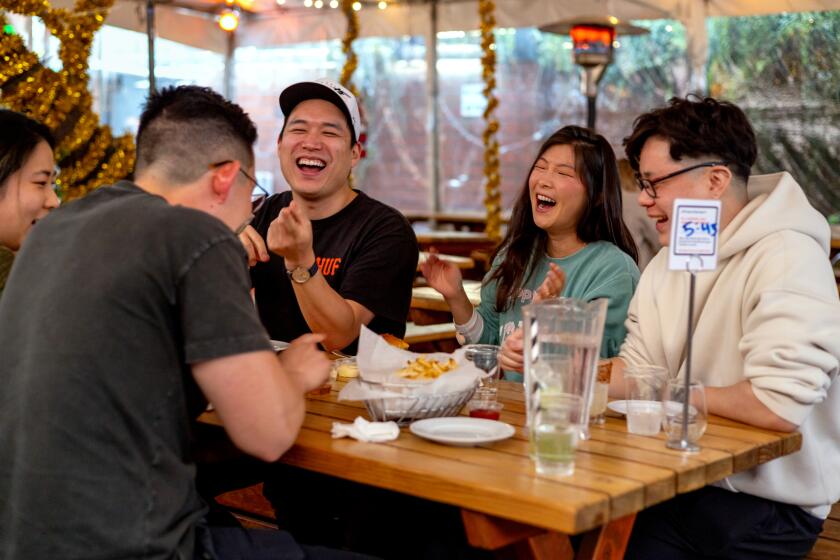Tasting Change, Feeding Success : A task force is working to upgrade food vending on problem-plagued Blythe Street as a first step toward reversing the area’s ills.
When I was 13 or 14, I would often buy roasted peanuts or noodles from a street vendor in Kuala Lumpur, where I grew up. The man would fry them up right there. The smell was delicious, and I remember thinking that his job was as good as any.
Perhaps it is a trace of that memory that makes it so gratifying to be involved in a new project that is one of the city’s attempts to address the desperate circumstances of Blythe Street in Panorama City.
Blythe Street, of course, is one of the Valley’s best-known streets. Blythe Street is as well known for poverty, gang activity and drug dealing as Ventura Boulevard is known for shops and restaurants. Blythe’s seemingly intractable problems are of such magnitude and long standing that the city has created a special task force to seek solutions.
Our project will address only one segment of the ills of the street. But I think it is noteworthy for showing how our city can respond to a challenge when it focuses its many resources. I am also proud of the role that Mission College, with which I am associated, is playing.
Beginning next month, we will teach modern food preparation to about 100 of Blythe’s street vendors.
Each morning, these men gather in apartments to do their cooking. There are about 100 of them in the stretch of Blythe that we are talking about. They cook corn, tortillas and other easy dishes, using raw materials over whose quality they have little control--for example, corn bought from a truck unloaded in back of their “kitchen.”
At lunchtime they trundle their carts down sidewalks that sprout a new harvest of trash every night. The rat-tat-tat of gang violence and the scenes of open drug dealing alternately jar their senses.
Their places of businesses are street corners, sidewalks and vacant lots. These places are fraught with danger from predators. The vendors can be evicted by police officers or chased by health inspectors, who rightly believe that they make little effort to conform to sanitation rules.
The vendors’ situation was brought forcibly to the public’s attention a few days ago when the city raided an apartment complex and cited a number of vendors for health and safety violations. Among other things, they were doing their cooking in a propane-fueled broiler on the floor of an apartment.
The raid pointed up the need for our program, which will be aimed at teaching them the proper, legal way to go about their business.
I became involved with the vendors at a meeting that I attended in 1992, a gathering of people associated with the Blythe Street Impact Team.
A committee of this multi-agency group, formed by the mayor’s office, was seated on folding chairs in a square of tables in a dimly lit union hall. It was my first meeting. There were about 20 of us, and we were talking about job training.
One agency reported on a plan for construction training for 30 youths. Another described a street job fair. Still another had plans for urban farming.
Then Blythe Street’s most extraordinary apartment owner, a compassionate activist named Genny Alberts, expounded on the vendors’ plight. What could we do for them?
A light bulb went on in my head. Mission College teaches culinary arts and entrepreneurial courses. I raised my hand and said, “I think we can help.” I said we might start a program and was greeted with enthusiasm--both from those at the meeting and the college administrators I spoke with later.
After nine months, several meetings (one with enthusiastic vendors), a successful grant proposal and a lot of planning, we will hold our first class in August in a rented building near Blythe Street.
Mission College’s Culinary Arts Institute will teach safety, sanitation, food preparation, purchasing and quality control. The Business and Professional Center will teach business skills.
The Immaculate Heart Sisters will help teach communication and math. The Agricultural Foundation, a small nonprofit operation in the northeast Valley, will teach them to grow vegetables.
A key element is a $250,000 grant from the city’s Industry and Commercial Development Department. It will pay for instruction, rent, equipment and support services.
If it goes as we hope, the vendors will emerge not only better-educated but with concrete plans for better employment. We have discussed a kitchen acceptable to the Health Department near Blythe Street, perhaps adjoining a market selling produce grown in the neighborhood.
The sweet smell of successful cooking does not yet fill the air. Struggling business owners resent the vendors. The vendors are suspicious of an empty promise.
Nevertheless, our experiment represents an effort to focus on some of the worst circumstances in Los Angeles and deal with them. Many of us believe that only education and training will bring poor people from where they are to a better life.
Another point of significance is the fact that it has become a goal of community colleges to assist in the economic development of the areas they are in.
I see this as a beginning. Maybe someone will say, “Let’s do the same thing in Pacoima, or on Delano Street.” Perhaps we will start a chain reaction. You’ve got to start somewhere.
More to Read
Eat your way across L.A.
Get our weekly Tasting Notes newsletter for reviews, news and more.
You may occasionally receive promotional content from the Los Angeles Times.






